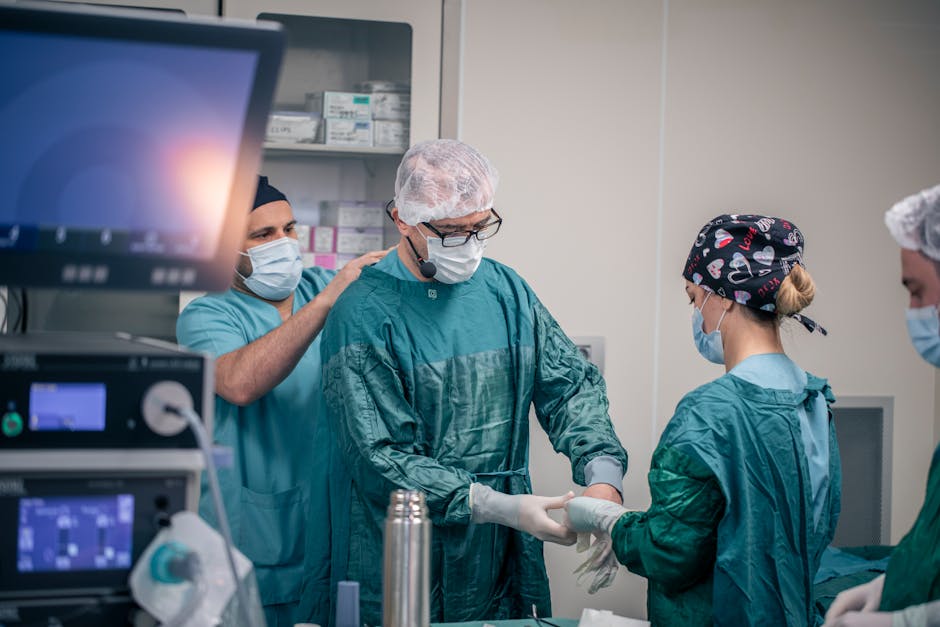Tips for Preparing for Surgery: A Comprehensive Guide
Undergoing surgery can be a daunting experience for many individuals. Whether it’s a minor procedure or a major operation, proper preparation is essential to ensure the best possible outcomes. From understanding the process to following pre-operative guidelines, there are several tips that can help you navigate the surgical journey with confidence. In this article, we will delve into the intricacies of preparing for surgery, offering valuable insights and practical advice to ease your concerns and set you up for success.
The Importance of Preparing for Surgery

Before we delve into specific tips for preparing for surgery, it’s essential to understand why this phase is crucial. Proper preparation can significantly impact the success of a surgical procedure, as well as the overall recovery process. By taking the time to get ready both physically and mentally, you can reduce the risk of complications, improve outcomes, and enhance your overall well-being.
Educate Yourself About the Procedure

One of the most important steps in preparing for surgery is to educate yourself about the procedure. Make sure you fully understand why the surgery is necessary, what it entails, and what to expect during and after the operation. Ask your healthcare provider to explain the details in layman’s terms, and don’t hesitate to raise any concerns or questions you may have.
Knowing what to expect can help alleviate anxiety and fear, making the entire process feel more manageable. Take the time to research the procedure, read reliable sources, and watch informational videos if available. The more informed you are, the better equipped you’ll be to handle the surgery and recovery.
Follow Pre-Operative Guidelines

Prior to surgery, your healthcare provider will provide you with specific pre-operative guidelines to follow. These instructions are designed to prepare your body for the procedure and minimize the risk of complications. It’s crucial to adhere to these guidelines diligently, as they can have a significant impact on the success of the surgery.
Common pre-operative guidelines may include fasting for a certain period before the surgery, avoiding certain medications, and refraining from smoking or drinking alcohol. Make sure you understand and follow these instructions to the letter, as deviating from them could jeopardize the safety of the procedure.
Prepare Your Home for Recovery

After the surgery, you will need a safe and comfortable environment to recover in. Take the time to prepare your home before the operation to ensure a smooth recovery process. Arrange for someone to help you with daily tasks, such as cooking, cleaning, and running errands. Stock up on essential supplies, such as medications, bandages, and comfortable clothing.
Set up a recovery area in your home with everything you may need within easy reach. Make sure this space is quiet, well-lit, and equipped with necessary amenities like a comfortable bed, pillows, and blankets. Having a conducive environment for recovery can promote healing and help you feel more at ease during the post-operative period.
Maintain a Healthy Lifestyle
Prior to surgery, it’s important to focus on maintaining a healthy lifestyle to optimize your body’s ability to heal. Eat a balanced diet rich in nutrients, stay hydrated, and get regular exercise to keep your body strong and resilient. Avoid unhealthy habits like smoking, excessive drinking, and poor dietary choices, as these can hinder the healing process.
Incorporate stress-reducing activities into your daily routine, such as meditation, yoga, or deep breathing exercises. Managing stress can help improve your mental well-being and prepare you for the challenges of surgery. Remember, a healthy body and mind are essential for a successful recovery, so prioritize self-care in the days leading up to the procedure.
Communicate with Your Healthcare Team
Effective communication with your healthcare team is key to ensuring a smooth surgical experience. Keep your healthcare provider informed about any changes in your health, medications, or lifestyle habits leading up to the surgery. Be honest about your concerns, fears, and expectations, so they can address them appropriately.
Ask questions whenever you have doubts or uncertainties, and don’t hesitate to seek clarification on any aspect of the procedure. Your healthcare team is there to support you and guide you through the process, so make the most of their expertise and experience. Remember, open communication can foster trust and collaboration, leading to better outcomes for you as the patient.
Prepare Mentally and Emotionally
Preparing for surgery isn’t just about physical readiness; it also involves mental and emotional preparation. Surgery can be a stressful and anxiety-inducing experience, so it’s essential to take care of your mental health as well. Practice relaxation techniques, such as mindfulness meditation or visualization, to calm your nerves and reduce anxiety.
Seek support from friends, family, or a mental health professional if you’re feeling overwhelmed or anxious about the surgery. Talking about your fears and emotions can help alleviate stress and provide you with the emotional support you need during this challenging time. Remember, it’s normal to feel anxious before surgery, but taking steps to manage your emotions can make the process more manageable.
Common Misconceptions About Preparing for Surgery
There are several misconceptions surrounding the preparation for surgery that can create unnecessary fear or confusion. Let’s debunk some common myths and misconceptions to help you approach the process with clarity and confidence:
Myth: You Shouldn’t Eat or Drink Anything Before Surgery
Fact: While fasting before surgery is often necessary, it’s essential to follow your healthcare provider’s specific guidelines. In some cases, you may be allowed to drink clear fluids up to a certain time before the procedure. Always clarify with your healthcare team to avoid dehydration or other complications.
Myth: Pain After Surgery Is Inevitable
Fact: While some discomfort is expected after surgery, modern pain management techniques can help minimize pain and promote faster recovery. Make sure to discuss your pain management plan with your healthcare provider and follow their recommendations for a more comfortable post-operative experience.
Frequently Asked Questions About Preparing for Surgery
Q: How can I reduce my anxiety before surgery?
A: There are several strategies to help reduce anxiety before surgery, such as deep breathing exercises, mindfulness meditation, and visualization techniques. You can also seek support from friends, family, or a mental health professional to address your concerns and fears.
Q: Is it normal to feel scared before surgery?
A: It’s entirely normal to feel scared before surgery, as it’s a significant and potentially life-changing event. Acknowledge your emotions and seek support from your healthcare team, loved ones, or a mental health professional to help you cope with your fears and anxieties.
To Wrap Things Up
Preparing for surgery is a multifaceted process that requires careful planning, education, and collaboration with your healthcare team. By following the tips outlined in this guide, you can set yourself up for a successful surgical experience and a smooth recovery. Remember to prioritize self-care, communicate openly with your healthcare providers, and prepare both physically and mentally for the procedure. With the right preparation and mindset, you can navigate the surgical journey with confidence and achieve the best possible outcomes.




